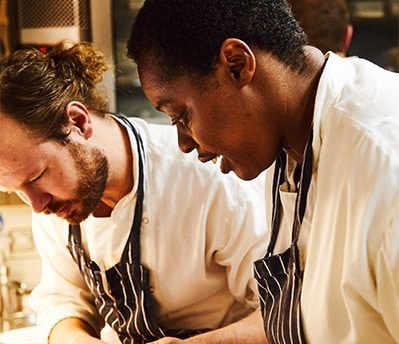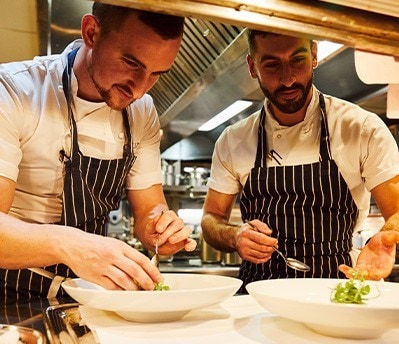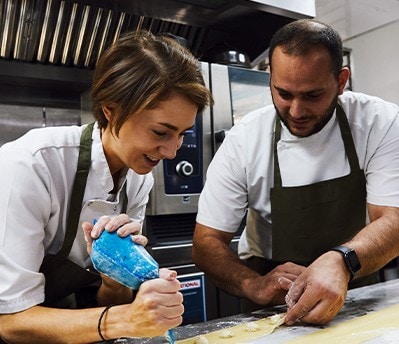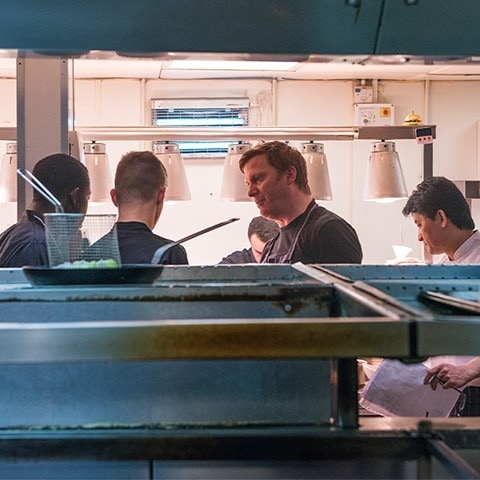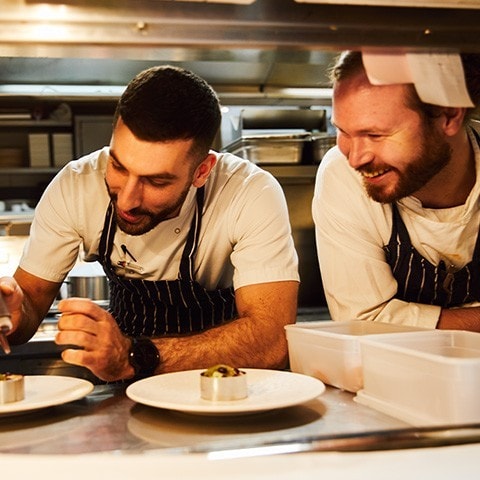The kitchen is a living, breathing machine of ingredients, appliances, and, most importantly, people. Teamwork is at the heart of a successful restaurant; however, the long working hours and stressful environment can sometimes cause team members to be out of sync.
To build a thriving, cohesive team, it’s crucial to focus on the qualities of an effective team and implement strategies for effective team leadership. Here’s how the TEAMS Code can guide you in creating a positive, collaborative kitchen and assessing team effectiveness to ensure continued growth and success.
What is the TEAMS code?
The TEAMS code was introduced by Positive Kitchens as a framework you can apply to your kitchen to foster a thriving working environment. It’s built around five key pillars that define the attributes of an effective team:
- Togetherness: Which means creating an environment where everyone feels welcome and diversity and inclusivity of race, gender, religion and age are encouraged.
- Empathy: By fostering an environment where everyone's opinion is valued, different ideas are possible, and feelings are respected, teams can feel at ease and communicate more effectively.
- Act as One: When teams pursue common goals, share knowledge, and grow together, they build the foundations of a successful future now.
- Mindful: Make sure you care for your team's physical and mental wellbeing. Create a safe and healthy environment where people feel safe and supported so everyone can thrive.
- Speak Up: Teams should be able to speak up about what's not working or can be improved. Every voice has an impact in shaping the kitchen culture and environment.
If you’re wondering how to build effective teams in restaurants, we’ve gathered the best tips from chefs and industry experts you can integrate into your day-to-day to help your team thrive.
The Top 9 Traits of Effective Teams
1. Embrace Inclusivity
Create a kitchen environment without cultural, gender, or age barriers. Promote cultural diversity and hire team members from different backgrounds. This will not only help you discover new cuisines and ingredients, but it will also create a sense of community by representing the demographics of the city the restaurant is in.
watch the video here.
A diverse team brings different perspectives, skills, and solutions to ensure the kitchen environment thrives even during stressful times.
2. Make it Feel like Family
When a restaurant feels like family, amazing things happen. Champion values that put staff wellbeing at the core, fostering an environment of education, patience, and family. Customers will also perceive this, as they will feel part of a community whenever they come and eat at your restaurant.
Chef Naama Tamir puts it succinctly: “It's not just about making money, it really is about creating a special place where there's education, and patience and family.” Hear more about creating a Positive Kitchen from Chef Tamir and her brother Assif, with whom she co-owns Lighthouse restaurant and Lighthouse Output in New York, below.
CHEF NAAMA TAMIR VIDEO
3. Promote Communication
Cultivating communication skills will ensure your team is aligned. Defining roles and expectations and keeping everyone informed will keep the staff effective and efficient. What's more, schedule time to check in with your team and get their feedback.
Need help opening the lines of communication? See our tips on How to Improve Communication in the Kitchen.
“Keep your staff informed of all developments and always get their feedback on how things are working,” says Chef Tebogo Ramatsui of Unilever Food Solutions. “I quite like morning stand-ups, where we discuss people's concerns in an open and constructive environment.”
CHEF TEBOGO RAMATSUI VIDEO
What’s more, you should explore different ways of communicating effectively with members of a team. A diverse team with different cultural backgrounds and sensibilities might require a more tailored tone and language that you should take time to understand.
4. Learn What Makes Your Staff Thrive
Knowing your teammates is crucial to understanding what will motivate or deflate them. Talk to them regularly and discover what gives them gratification and makes them happy so you can find the right way to get through to them and help them become a better version of themselves in the workplace.
Watch chef and restaurant owner Michael Gulotta below discuss the importance of work-life balance and being a leader who truly cares about his employees and their goals. His philosophy is, “Running kitchens is all about finding out what motivates people.”
MICHAEL GULOTTA VIDEO
5. Excite Passion
The high-pressure work environment of the kitchen can sometimes put your culinary passion in the background. That’s why it’s important to keep the flame burning by sharing mutual inspiration with your crew.
Remind yourself and others why you love what you do, bring the attention back to the food as a 360º sensory experience, created by skills, culture and passion coming together. Furthermore, encourage your team to keep learning and stay up to date with the latest ingredients and cooking techniques.
6. Encourage Learning
Make time for training so the team can learn new skills and keep levelling up. However, training shouldn’t just be about technical skills. Focus on developing soft skills like effective team communication and empathy, which are vital for collaboration.
Teach employees about the value each member contributes to the overall guest experience. When employees see the big picture, it helps them feel more invested in the operation's success.
Chef Mary Worthington, Unilever Food Solutions Chef, echoes this idea in her video, below: “In my experience, it's important to teach every employee about how they contribute to the overall guest experience... This makes them feel more invested in the success of the operation. When all your employees see the big picture, they are all likely to feel a part of the business, which is hugely important to its success.”
MARY WORTHINGTON VIDEO
7. Recognise and Reward Hard Work
Once you have a trained and experienced employee, the last thing you want to do is see them leave the business because they feel stressed or unappreciated. Think of ways you can reward your staff to keep them feeling engaged, motivated, and happy.
Raises and bonuses are a great way to keep your staff, but so is recognition among peers and respect for the person behind the job, for example, offering extra time off.
8. Foster a Culture of Balance
Long hours and late shifts can wreak havoc on employees’ physical and emotional wellbeing. Encouraging a culture of balance, where every employee takes scheduled breaks and takes time away from the kitchen, can help keep them happy and focused when they return to the job.
Chef Danielle Venter, Chef at Unilever Food Solutions, says: “If there is one way to sap an employee’s motivation and passion, it’s to expect them to work long hours with no break. It’s so important to encourage a culture of balance, where employees take scheduled breaks to refresh and recharge. They then return to the kitchen full of energy, passion and focus – which is exactly what you want from your staff.” See more from her below.
CHEF DANIELLE VENTER VIDEO
9. Listen to Feedback
“When people feel valued, appreciated, heard and respected, they will go above and beyond for their employer. In my experience, a kitchen based on an ethos of respect will always outperform a kitchen based on an ethos of fear or humiliation,” says chef Heidi Hackermann.
Create a trustworthy space where everyone can be open about what is and isn’t working in the kitchen. Listening without judgment fosters trust, leading to better leadership and team effectiveness.
CHEF HEIDI HACKERMAN VIDEO
Working effectively as part of a team in a restaurant is possible if you and your teammates implement the TEAMS pillars and take steps towards a better, healthier environment every day. You’ll create an environment where individual and collective success is a reality through mutual respect, open communications, and celebrating each other’s efforts and milestones.
Download and print the TEAMS Code for your kitchen here.
